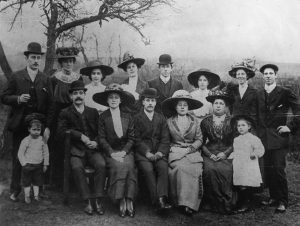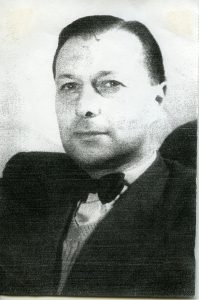 Geoffrey Palmer (no, not Geoffrey Palmer who appeared with Dame Judi Dench in the TV series “As Time Goes By”) was a member of the well-known Rabbitt family, and born at Kirkstall Lodge, Edwinstowe in 1912.
Geoffrey Palmer (no, not Geoffrey Palmer who appeared with Dame Judi Dench in the TV series “As Time Goes By”) was a member of the well-known Rabbitt family, and born at Kirkstall Lodge, Edwinstowe in 1912.
Geoffrey Palmer n.d.
Wedding William Rabbitt Ivy Fletcher 1912
Back Row: Fred Fletcher (Bride’s Brother) Gillian (Sister in Law) Ida Rabbitt (Groom’s Sister) Alice Fletcher (Bride’s Sister) Fred Rabbitt (Groom’s Brother) Ivy Rabbitt (Groom’s Sister) Theresa Rabbitt (Groom’s Sister) Harry Rabbitt (Groom’s Brother)
Front Row: Archie Fletcher (Bride’s Nephew) Archie Rabbitt (Groom’s Brother) Mabel Fletcher (Bride’s Sister) William Rabbitt (Groom) Ivy Jelly Fletcher (Bride) Emma Fletcher Bride’s Mother) Sybil Fletcher (Bride’s Niece)
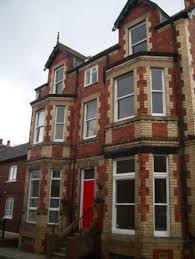 Kirkstall Lodge High Street Edwinstowe
Kirkstall Lodge High Street Edwinstowe
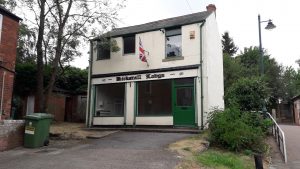
Kirkstall Lodge former coach house/garage – 2022
He trained as a teacher and taught until the beginning of World War Two when his pacifist convictions and consequent exemption from military service meant he had to leave the profession. During the war he worked in the ambulance service and in the theatre with the Adelphi Players. He formed his own small theatre group and eventually joined the Rock theatre Company where he met Noel Lloyd. Together they wrote books for children, ghost stories, biographies, also about music, archaeology, folk customs, social history, and 3 “Observer” books.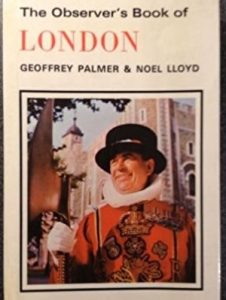
Geoffrey resumed teaching and in 1951 was appointed a deputy head, later becoming headmaster of Highbury Quadrant School – a post he held for 19 years. After retirement Geoffrey and Noel opened bookshops in Islington and Eye, Suffolk. Geoffrey died in Norwich in 2005.
In 1996, Geoffrey donated his and co-author (Noel Lloyd’s) three volumes of children’s stories to Edwinstowe Library to replace the Library stock which, due to popularity, had not stood the test of time. As the books chronicled the exploits of several children and their lives in the village of Edwinston on the edge of Sherwood Forest it is no wonder they were enjoyed by the local children.
Local Author Donates Trilogy to Edwinstowe Library
Local octogenarian author Mr. Geoffrey Palmer has recently donated his three volumes of children’s stories to Edwinstowe’s local history stock. The three books, “Mystery in Sherwood”, “The Greenwooders”, and “The Greenwooders’ Triumph” were first published in the early 1960’s when they were bought extensively for library stock. However, their popularity was such that they were borrowed so much their library life was not a long one and it is with pleasure that Edwinstowe Library receive these copies from the author.
The books chronicle the exploits of Felicity Brooks, her brother Tony and their friends Stephen, Sam, Pater and his twin Pauline, and their lives in the village of Edwinstowe on the edge of Sherwood Forest, (no prizes for guessing which village Edwinstowe is based on). Mr. Palmer is no stranger to living in a village on the edge of Sherwood Forest, having been born at Kirkstall Lodge (on the High Street), into the Rabbitt family – a well-established Edwinstowe name.
The books (which have all been signed by the author), will be added to the local history lending stock at the end of November and may be borrowed from then on. So, if you are an older reader who would welcome the chance to revisit the books of your youth and see how many local places (and people) you can recognise in fiction, or a younger reader who would like to discover Geoffrey Palmer and his co-author, Noel Lloyd, for the first time, visit Edwinstowe Library – a friendly welcome awaits you!
Geoffrey’s Obituary link here.http://www.pinktriangle.org.uk/glh/243/palmer.html
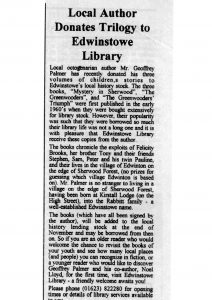
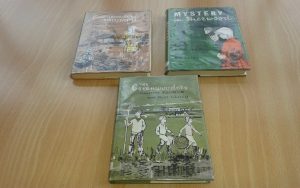
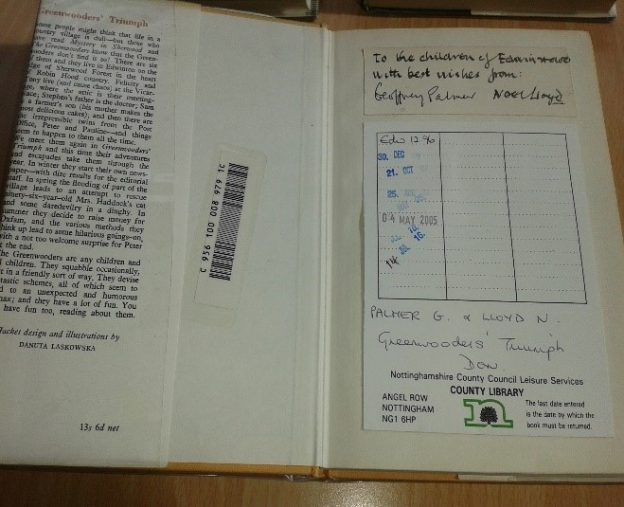
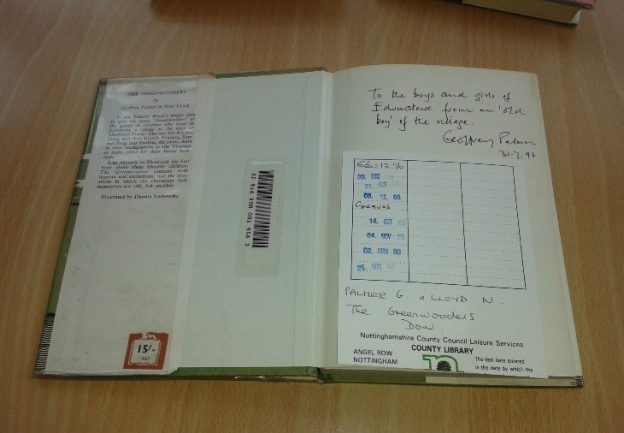
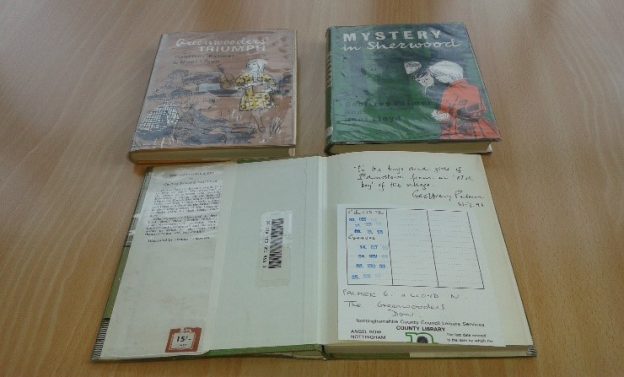 Published: Tuesday, 25 August 2015 17:38
Published: Tuesday, 25 August 2015 17:38
THIS is a shortened version of an article entitled ‘You Don’t Have to be Sad to be Gay’ by GEOFFREY PALMER for the winter 2004/5 issue of The Gay and Lesbian Humanist. He died shortly after, aged 92.
If I want to boast a little, I tell people that I was born before the First World War. Well, so I was, in 1912, but the announcement never seems to impress many people, so usually I keep my secret hidden. I don’t remember much about the war itself, except for the Zeppelin that passed over the village, and the flags and balloons that decorated the shops and cottages on Armistice Day. But, above all, I remember my grandmother saying, bitterly, “Why should I have anything to celebrate? I’m the only person in the village to have had two sons killed.” (The Titanic went down in 1912 too.)
When I was five I felt there was something different about me but I couldn’t explain this difference. I was usually in charge of the makeshift costumes that the cops and robbers or, more often, Robin Hood and his merry men wore (because this was Sherwood Forest country), and when I was cast as Maid Marian or a lady cop I willingly accepted the role, principally, I think, because I had to be kissed by one of the winning teams at the end of the game after I had been captured, or released.
No, the difference never came to be important until I reached early adolescence, when I began to see that I was forever eyeing blokes rather than girls, but never in a sexual way. I just accepted the fact that I preferred a kiss from a boy than from a girl and never stopped to wonder why.
At grammar school my allegiances were divided. There were at least three girls I grew very fond of, and one in particular. I travelled to and from school by bus so that I could sit next to her and put my arm round her waist, which she didn’t seem particularly to care about, but put up with. At college in the early 1930s things were different. The good-looking men of my age received a lot of attention from me from a distance (I was shy in those days) and one or two of them reciprocated in a polite way, though without much encouragement.
At the end of the course I was notorious for two things: snogging the local “anybody’s girl” under a bridge in Wollaton Park, and finding out for the first time the real difference between male and female. Pale interest rather than rampant desire was the final outcome of these sessions, and falling in love quite seriously with a lovely girl I was going to propose to until I found out that she was secretly engaged to a man of thirty. I relinquished her with a good deal of heartburning, but it didn’t last when a new roommate swam into my ken and engaged my attentions with a good deal of reciprocal interest; and my first venture into physical pleasure was thus engendered.
Then it was time for the wide world of teaching: a village church school where I lasted for five years. In all that time my main interest, apart from the local dramatic society (alas, no parts where men kissed men!), was the 18-year-old brother of one of my pupils – he, at 14, was far too young for me. Sid, the 18-year-old, would do anything for anybody, including me, now getting less and less shy.
When the war came to an end in 1945 I became a professional actor and joined repertory companies in Sheffield, Wakefield and Nottingham; did a tour of Murder in the Cathedral, A Midsummer Night’s Dream and Tobias and the Angel.
My real life began in a Bradford theatre bar after a show, when I was having a drink and reading the New Statesman – that was when it was worth reading. I suddenly realised that my hand, under the table, was being sort of caressed in a totally acceptable way by another hand. I glanced round to see who was being so daring and found that he was a young actor who had recently joined the company and was rehearsing the next play. He had fair hair, blue eyes and a half-scared, half-determined expression on his face. I gave his hand a thorough grasp to say, “Carry on, I don’t mind” – and fell hook, line and sinker in love, a real love, not something I’d imagined, or vaguely experienced, or looked forward to over the years, but a love that was to last for 53 years, a feeling that was to take over my life, and that was reciprocated with the same degree of fervour by the owner of the hand that was now clasping mine with an ironlike grip. I discovered that his name was John – though he preferred to be called by his second name, Noel – and that he was 12 years younger than I was.
From 1945 to 1998 Noel and I enjoyed a sweet and loving partnership which, over the 53 years it lasted, gave the lie to every bigoted fundamentalist, from Jehovah’s Witness to Roman Catholic, who expressed horror at the thought of two men living together, loving together and finding all the happiness in each other’s company their natures required. “They can live by Leviticus and die by Leviticus,” I used to say, “but we live by love and, yes, would die for it, if necessary.” And the Old Testament, particularly, became for me a Chamber of Horrors.
Noel and I shared flats together, wrote more than thirty books together, had an enormous amount of fun together and travelled widely.
Noel worked a lot in Northern Ireland for the BBC and the Ulster Group Theatre, and did a long stint at the theatre in Minehead, Somerset – though at every opportunity we would meet at the most unlikely places for a session to find delight in our loving together, to get on with the book we were writing and plan the next one – and I sometimes played small parts in plays during my summer holidays.
For some years we rented a flat exactly opposite the brand-new school in Islington of which I was now the headmaster; and Noel became a sort of unpaid appendage of the school – producing plays, using his car to take unwell children home, taking teams to football and cricket matches – and became as much part of the scene as any paid member of the staff. This went on until 1975, when it was time for me to retire after eighteen years of the headship, and time for Noel to give up work in TV, which he did not enjoy.
So we were free from bricks, children and cameras, and, though continuing to write, we went in for keeping bookshops, in Islington, Eye, and, latterly, Harleston in Norfolk. And in all those years I can remember only one occasion when we had a serious row.
I don’t know now what it was about, but it ended up with one of us throwing the telephone at the other, though for the life of me I can’t remember who did what to whom, and the whole affair took only about ten minutes, finishing up with a good laugh and a stiff drink.
The bookshops did well and we were able to do a lot of travelling; and it was on the aeroplane from Seattle, my favourite American city, that I began to feel unwell, and developed a heart condition that gradually grew more serious and eventually demanded the wearing of a pacemaker. But life continued to be worth living with Noel by my side. We wrote more books, haunted the theatre, entertained friends, and loved each other more with every day that passed – until Noel died suddenly in August 1998, of a heart attack. Then memories were all that remained and living them was what made a happy homosexual able to stay happy.
And, to finish with a boast, I can say that, though hundreds of children and their parents, staff, governors, administrators and political figures passed through my life, never once did I detect a sniff or hear an unkind remark, a comment on my sexuality, a critical glance or doubtful shrug in over fifty years of open and honest gayness. My parents, bless them, were simple village people and did not know a hawk from a handsaw.
“I am what I am” was, and still is, my creed, “and, if you don’t like what I am, then it’s you that’s got the problem, my friend.” No child felt awkward in my presence: he or she was too busy grinning at one of my weak jokes. And the only physical contact that passed between us was a ruffle of the hair or a smack on the bottom – and only then when Mum or Dad was present and we were laughing at something outrageous that the child had done. I haven’t an ounce of paedophilia in me and that has helped me in my relationships. I’ve been a humanist for at least sixty years and I thank God that I don’t believe in him. Strange, though: I always watch the gloriously silly Songs of Praise. It’s a good laugh and the tunes are worth listening to.
Only recently I received a card from a not-long-married great-nephew who had heard from his mother the inside story of my thoroughly debauched life (according to religionists) and his response was, “Good on you, mate. Keep it up.” Which, in the necessarily short time I have left, I intend to do. You don’t have to be sad to be gay!
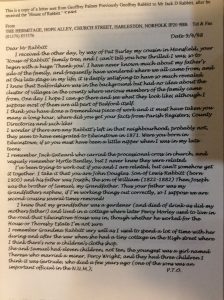
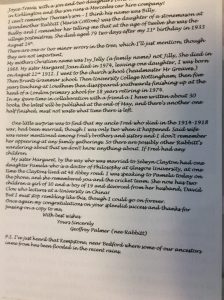
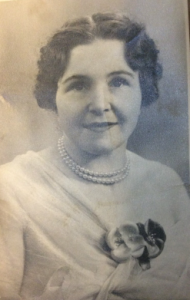 Early Life of Madge Riley nee Rabbitt.
Early Life of Madge Riley nee Rabbitt.
Her dad Harry received this booklet signed by Madge.
Madge was also known as Mrs. Wallhead wife of the builder and mother to John and another sibling.
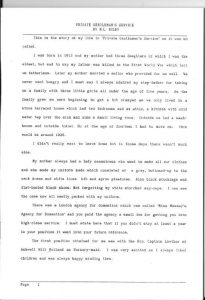
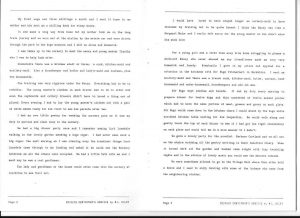
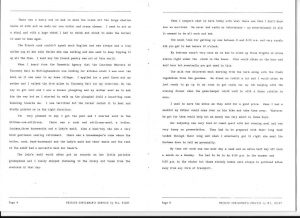
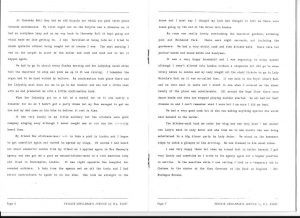
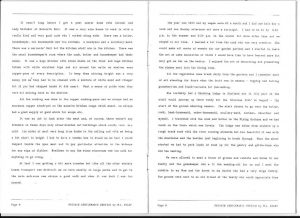
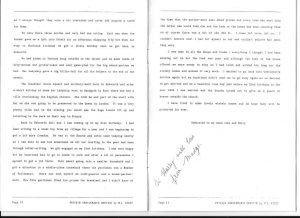
Biography of Geoffrey Palmer who died 22.1.2005 (as I remember it) – Mrs Pat Burley.
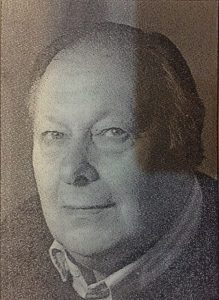 “My cousin, Geoffrey Palmer, died aged 92. It’s a great age, and I’m glad he made it. Fortunately, he didn’t suffer too much.
“My cousin, Geoffrey Palmer, died aged 92. It’s a great age, and I’m glad he made it. Fortunately, he didn’t suffer too much.
Geoffrey, his sister, Margaret, 6 years younger than him, and me, 9 years younger, were brought up in Edwinstowe, in the heart of Sherwood Forest. Remember Robin Hood.
Our grandparents, Arthur and Emma Fletcher, moved into a Pub there at the beginning of the 20th century. Grandfather, Arthur, died early in the century, leaving his wife and 4 children, Fred Alice, Ivy and Mabel. However, before he died, he had the good sense to have a house built opposite the ‘Black Swan’ for his retirement. Granma stayed in the Pub until the end of World War 1, and then they moved into Kirkstall Lodge where Geoffrey, Margaret and I were raised.
Ivy, Geoffrey’s mother had married a local man William Rabbitt. He was one of the 11 children, 2 of whom were killed in the first World War. No wonder Geoffrey was a conscientious objector during W.W.2, but more of that later.
I was Alice’s daughter.
When Geoffrey left our local Grammar School, Brunts, he went to Nottingham University, about 1929. There weren’t many people going to University in those days. One had to be extremely clever. I used to tell him that, but he wouldn’t accept it.
After leaving University, he became a Teacher in Lowdham, Notts’. and then wrote his first book,”To church on Sunday”. Unfortunately, I haven’t got a copy of it, but I have read it. He then went on to be a teacher in London.
I remember when he visited Kirkstall Lodge in Edwinstowe about 1938, he told me he had joined the P.P.U. (Peace Pledge Union) It didn’t mean much to me as I was only 15 at the time, and I didn’t think another war was imminent. Therefore, when war was declared in 1939, he was a conscientious objector. He didn’t believe in innocent people being killed. Consequently, he had to relinquish his vocation as a Teacher, but worked in the Ambulance Service in London, which, to say the least, was rather traumatic.
I left Edwinstowe in 1938, and lived in Sheffield for 3 years, so didn’t have much contact with Geoffrey. I returned to Mansfield in 1942, got married, and my Husband and I spent our honeymoon in London, where we met Geoffrey. I fondly remember him buying a watch for £2.5s, which was a lot of money in those days, and left him nearly penniless.
Shortly, after this he went into acting, and entertained a lot of Troops abroad.
During all this time, he had changed his name from Geoff Rabbitt to Geoffrey Palmer. You can imagine what it would be like a teacher with a name like ‘Rabbitt’.
Margaret, his sister, married Selwyn Clayton, a sailor in the Royal Navy, in 1940, and Pamela was born in 1943. Margaret died in 1972.
After the War, Geoffrey resumed his vocation as a Teacher, and became Headmaster of a school in London. His Father had died in 1948, and, shortly after that, his Mother went to live with him, and died in 1964. I remember visiting them in London in 1961 when I was on N.C.B. Typing Supervisors’ Course.
Leaving London 1967, he and his partner Noel Lloyd, who I think he met whilst acting, brought a Bookshop in Eye, Suffolk. Together they had written many interesting books, especially Children’s books about Sherwood Forest, also Jean Alexander’s biography (ex Coronation Street) They also wrote books about the Brontes in Yorkshire, of which I have quite a few. My husband and I visited them in Eye, but have never been to Harleston. We went to one of their Book Fayres in Norwich, whilst visiting a friend in Sheringham, also, to one in Lincoln, when we persuaded them to come back to us in Mansfield to stay the night. I haven’t seen Geoff since since 1997 when Noel brought him to my Husband’s funeral, and, sadly, Noel died about a year after that. However, we talked a lot on the phone. I shall miss him, but he had a long and interesting life. ”
Geoffrey Palmer (1912 – 2005)
Geoffrey Palmer died at the age of 92 on 22 January. He had been in hospital in Norwich for only three weeks at the end of a long and productive life. He will be remembered very affectionately by many booksellers and customers in London and East Anglia in connection with the Compton Bookshop and, later, Hermitage Books. Both businesses were run with Noel Lloyd, who was his much ;loved partner for more than fifty years.
Geoffrey, a GALHA member, was born in Edwinstowe, Nottinghamshire, on the edge of Sherwood Forest in 1912. He trained as a teacher and taught in Nottinghamshire and Middlesex until the beginning of World war Two, when his pacifist convictions and subsequent exemption from military service obliged him to leave teaching. His war years were spent doing civil defence work in the ambulance service and in the theatre with the Adelphi Players. He later formed his own small theatre group, worked with repertory companies in Wakefield, Sheffield and Nottingham, and eventually joined the Rock Theatre Company. It was while working for this company that he met Noel , and both went on a six-month CEMA tour of the Far East.
After the war, and by now settled in London, Noel got a job with the Adelphi Guild Players and Geoffrey resumed teaching. He was appointed a deputy head in 1951 and in 1955 the headmaster of the new Highbury Quadrant School. He remained there until his retirement nineteen years later.
Geoffrey’s first book and only novel, To Church on Sunday, was published by Chapman and Hall in 1940. It is now almost impossibly hard to find. It is argued the beginning of a later writing career Noel. Their first joint book was published in 1962 and was followed by thirty more. The books consisted of adventure and ghost stories and also many non-fiction titles for young people. Later significant titles included three “Observers” books published by Warnes, and biographies of E. F. Benson and also of his father. Geoffrey had long had a knowledgeable enthusiasm for Benson (and a book collection to match).
After his retirement in 1976, Geoffrey and Noel opened their bookshop in Upper Street, Islington, followed later by another in Eye, Suffolk. They issued many catalogues of general, modestly priced literature and were well-known figures on the East Anglian book-fair circuit until before Noel’s death in 1998. Geoffrey’s last years were clouded by loss and by gradually declining health, but were not unproductive. He completed and published two useful monographs on the Brontë’s (another long-held enthusiasm) and republished some of the earlier PalmerLloyd titles. He issued a final couple of catalogues.
Geoffrey joined the GALHA when Noel died (Noel had been by then a member for ten years) and Geoffrey made a generous donation to the group in Noel’s memory. He also made a bequest in his will to GALHA’s associated charity. the Pink Triangle Trust.
Geoffrey remained interested in the world and its ways, alert to the life of his friends companion in his opinions, generous, brave, a good companion and a memorable personality. He will be much missed.
GALHA – Gay & Lesbian Humanist’s Society
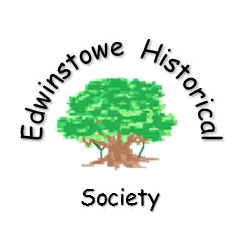 Edwinstowe Historical Society
Edwinstowe Historical Society